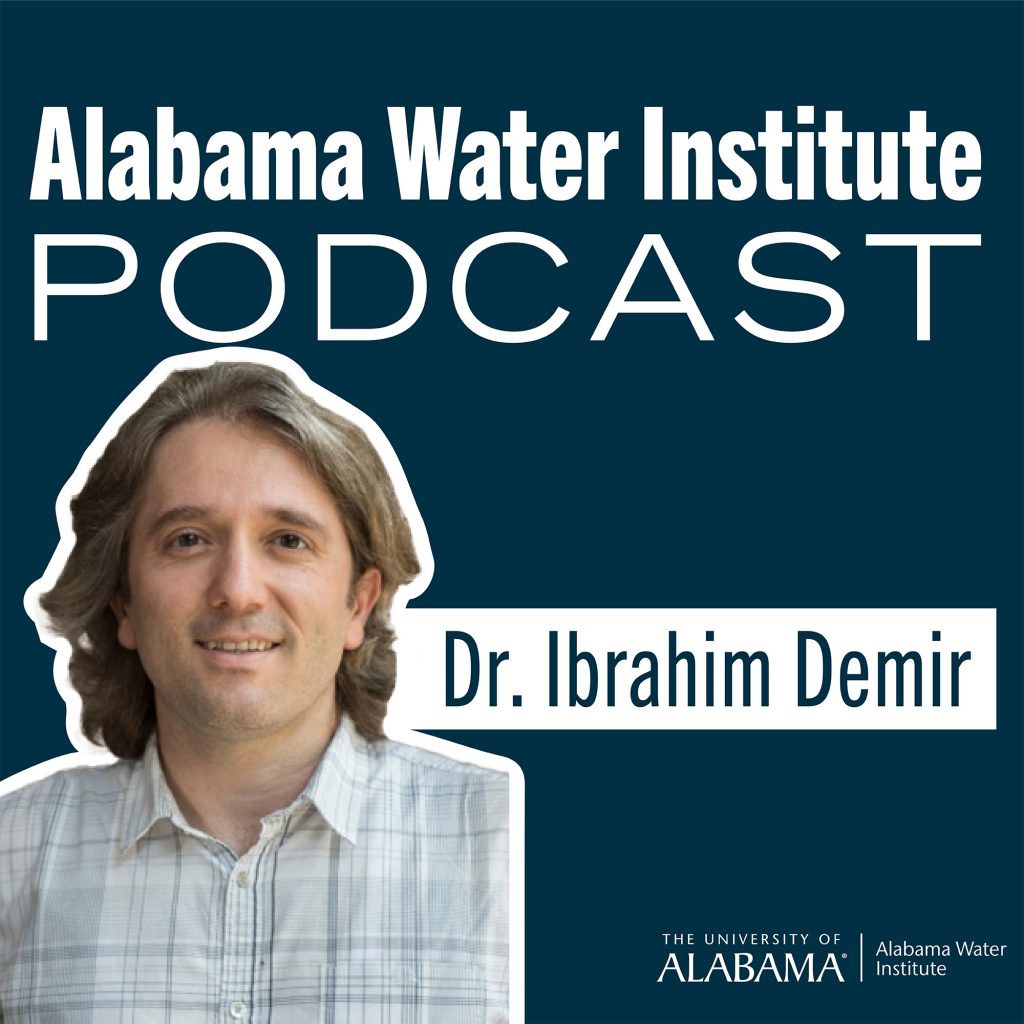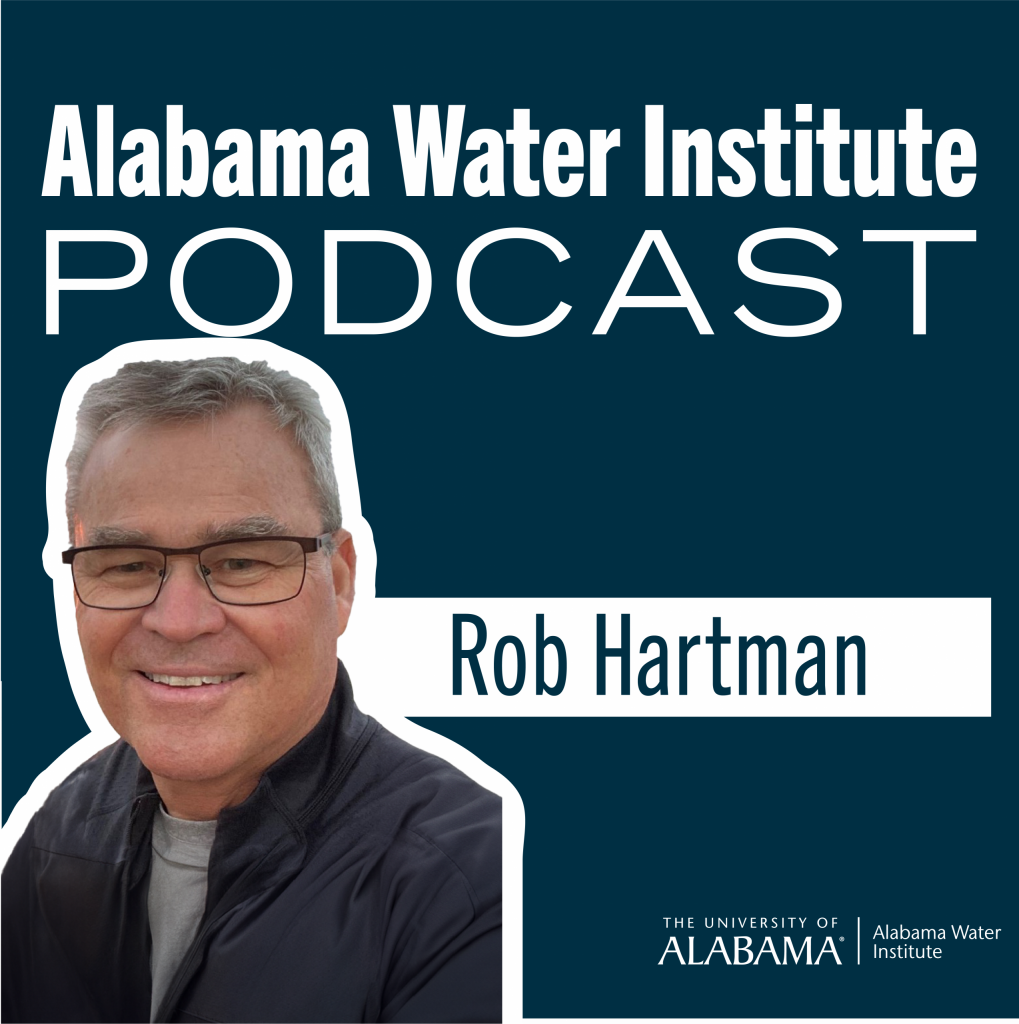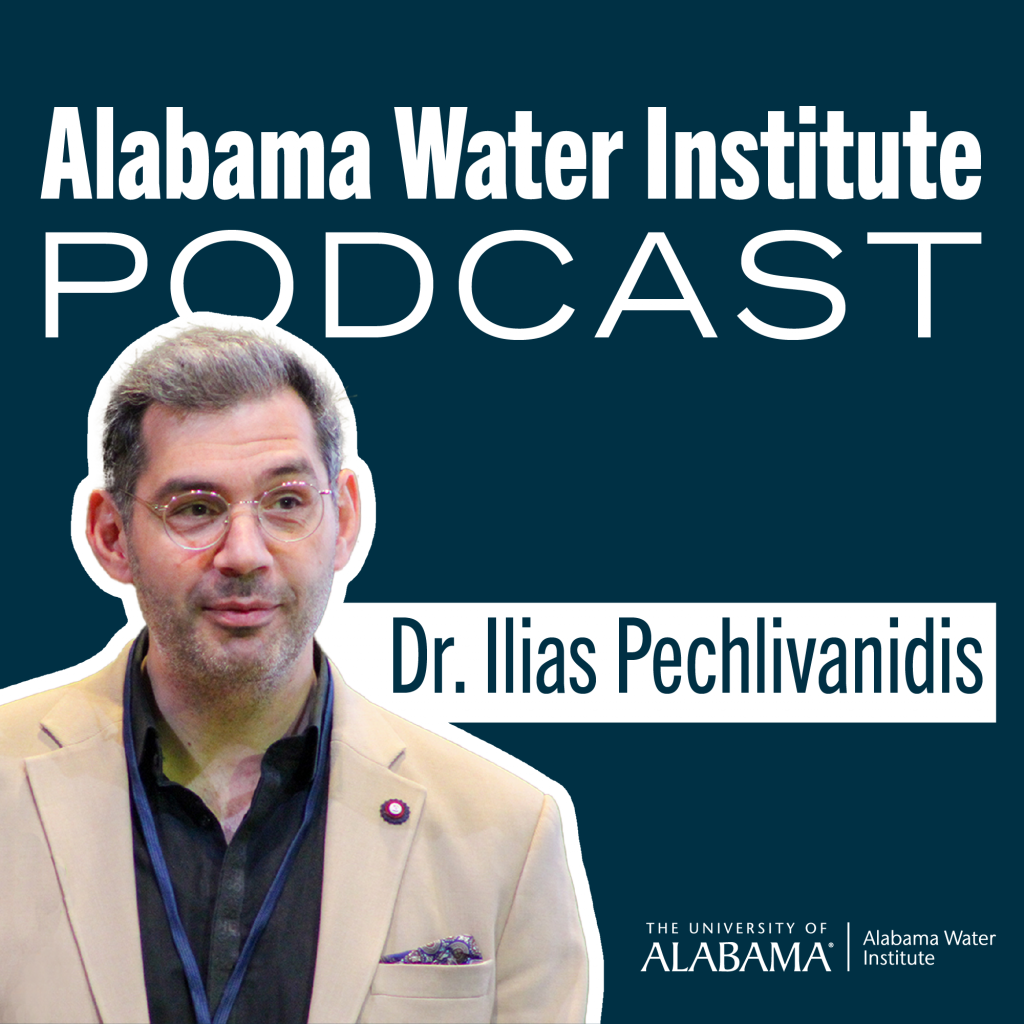
Where to Listen:
Episodes

Ep. 27: How Floodplains Shape Flood Risk with Dr. Rebecca Diehl
Dr. Rebecca Diehl of the University of Vermont joins the podcast to discuss how rivers and floodplains really work, and why that matters for flood risk and resilience. A CIROH collaborator, she shares how new floodplain mapping approaches, field data and geospatial tools are helping improve flood prediction and inform smarter decisions for communities facing more frequent flooding.

Episode 26: Dr. Ibrahim Demir on Forecasting Tomorrow’s Floods with AI
Dr. Ibrahim Demir, the Michael A. Fitts Presidential Chair in Environmental Informatics and Artificial Intelligence, and professor of river-coastal science and engineering at Tulane University, discusses how artificial intelligence is transforming the way we forecast floods, manage water resources, and communicate environmental risks.
Ibrahim’s research focuses on using data-driven systems, machine learning, and digital twins to make hydrologic forecasting faster, smarter, and more accessible for communities everywhere.

Episode 25: Turning Water Forecasts into Action with Dr. Martyn Clark
Dr. Martyn Clark, professor of hydrology at the University of Calgary, joins the AWI Podcast to discuss hydrologic modeling and predicting where water will flow. Clark is a global leader in building advanced models that push environmental forecasting forward and help turn predictions into action.

Episode 24: Forecasting the Future: Rob Hartman on Advancing Hydrologic Predictions
The Alabama Water Institute and CIROH recently hosted the 20th anniversary of HEPEX — a global collaboration to improve hydrologic forecasting and its use in real-world decisions. Rob Hartman, a consulting hydrologist with 35 years of federal flood and water supply forecasting experience, shared insights from his time leading the National Weather Service California–Nevada River Forecast Center, his work on the Forecast Informed Reservoir Operations project, and how agencies are using forecasts to guide reservoir operations and flood management today.
Visit HEPEX: https://hepex.org.au

Episode 23: HEPEX with Dr. Ilias Pechlivandis
HEPEX (Hydrologic Ensemble Prediction EXperiment) is a global community of researchers and practitioners in hydrological ensemble prediction. It brings together people contributing and working on specific topics related to hydrological forecasting and hydrometeorological ensemble prediction.
The group recently held its 20th anniversary workshop at The University of Alabama, hosted by the Alabama Water Institute and CIROH. Dr. Ilias Pechlivanidis, co-chair of HEPEX and associate professor and senior researcher in hydrology at the Swedish Meteorological and Hydrological Institute, explains what HEPEX is and why hydrological ensemble prediction is important.
Visit HEPEX: https://hepex.org.au

Episode 22: Megadroughts with Dr. Toby Ault from Cornell University
Dr. Toby Ault is an assistant professor of earth and atmospheric sciences and the director of graduate studies for atmospheric sciences at Cornell University. Ault joins us for this episode to discuss various climate topics, including megadroughts.
Ault’s research coalesces around three areas of inquiry related to emergent climate risks: (1) estimating the risk of prolonged drought under climate change; (2) understanding the dynamics of seasonality, particularly spring; and (3) characterizing variations in the Tropical Pacific on timescales of decades to centuries, and their influence on global climate. His methods entail data synthesis from observational sources as well as numerical and statistical modeling. The nature of his work is therefore highly interdisciplinary, affording him the opportunity to collaborate closely not only with climate scientists and modelers, but with colleagues in many other disciplines, including geography, paleoclimatology, and ecology.

Episode 21: Dr. Kate Brauman of the Global Water Security Center
Dr. Kate Brauman is the associate director for communications and analysis for The University of Alabama’s Global Water Security Center.
Brauman is a globally recognized thought leader in water resources and ecosystem services. Her research quantifies how changes in nature affect human wellbeing, with a particular focus on water resources. In addition to research, Brauman is committed to and skilled at science communication.
In this interview, we’ll get to know a little bit more about Kate, her research, and why the GWSC is such an important resource in the world of water.

Episode 20: Dr. Steven Burian, AWI Director of Science and CIROH Executive Director
Dr. Steven Burian is AWI’s director of science, the executive director of NOAA’s Cooperative Institute for Research to Operations in Hydrology (CIROH), and a professor of civil, construction and environmental engineering.
In this episode, he discusses the newly awarded CIROH and the impact of water research from AWI and The University of Alabama.

Episode 19: Global Water Security Center Director Mike Gremillion
Mike Gremillion is the director of the Global Water Security Center and deputy director of the Alabama Water Institute at The University of Alabama.
In this episode, he discusses the foundation of the GWSC and how it will make a lasting impact on water security, quality, and research for a global society.

Episode 18: Dr. Cory Armstrong on Effective Severe Weather Communications
Dr. Cory Armstrong is the chair for the Department of Journalism and Creative Media in The University of Alabama’s College of Communication and Information Sciences. Her areas of research include media diversity, influences on media content and media messages concerning severe weather.
She was recently awarded a $15,000 grant to partner with the National Weather Service office in Memphis, Tennessee, to study how effective tornadic-related weather information is on the public.

Episode 17: Dr. Carla Atkinson on Freshwater Mussels and Intermittent Streams
Dr. Carla Atkinson from The University of Alabama’s Department of Biological Sciences discusses the importance of freshwater mussels, intermittent streams and her recent awards and grants to continue her research on both.

Episode 16: Alabama Wastewater Project and Grant with Dr. Mark Elliott
Dr. Mark Elliott discusses a new grant from Columbia University to begin researching more affordable and healthier wastewater solutions in Alabama’s Black Belt region. The project is a collaborative effort from several universities and organizations.

Episode 15: Dr. Mojdeh Rasoulzadeh from UA’s Department of Mathematics
Dr. Mojdeh Rasoulzadeh joined us for our H.U.B. Talk series. She is an assistant professor in the Department of Mathematics at The University of Alabama. Her research involves flow and transport modeling in highly heterogeneous subsurface formations. She also studies analytical solutions and numerical simulation of hydro-mechanical-chemical processes in porous media, as well as groundwater flow modeling in karst aquifers.

Episode 14: Dr. Glenn Tootle from UA’s College of Engineering
Dr. Glenn Tootle from The University of Alabama’s College of Engineering discusses his recent Fulbright Scholar Grant and researching paleohydrology at home and abroad as a civil engineer.

Episode 13: Dr. David Weston from Oak Ridge National Laboratory
Dr. David Weston, senior staff scientist from Oak Ridge National Laboratory, spoke at the AWI Symposium in December 2019. The topic for his presentation focuses on implications on a plant-microbiome system influencing peatland carbon and nitrogen cycling.

Episode 12: Dr. Mustafa Morsy on How Plants Respond to Environmental Stress
Dr. Mustafa Morsy, professor in the Department of Biological and Environmental Sciences at The University of West Alabama, talks about understanding how plants deal with environmental stress, as well as using fungal endophytes to improve crop productivity.

Episode 11: Dr. Timothy Logan, Director of the Houston Lightning Mapping Array Network
Dr. Timothy Logan, director of the Houston Lightning Mapping Array Network at Texas A&M University, discusses tracking and predicting lightning and how to effectively use that data for weather events.

Episode 10: Dr. Cecilio Ortiz García and Dr. Marla Pérez Lugo on University Roles Before and After Disasters
Dr. Cecilio Ortiz Garcia and Dr. Marla Perez Lugo, professors at the University of Puerto Rico-Mayaguez and founders of the RISE program, discuss the roles of universities in pre- and post-disaster environments.

Episode 9: Dr. Silvana Croope on Flooding and Transportation Infrastructure
Dr. Silvana Croope, resilience research engineer with the Alabama Transportation Institute, discusses transportation infrastructure risks and flooding.

Episode 8: Dr. Ryan Earley on Chemical Effects on Behavior in Fish
Dr. Ryan Earley, associate professor in The University of Alabama’s Department of Biological Sciences, talks about his research into pollutants and the chemical effects on fish. He focuses specifically on mangrove rivulus, a self-fertilizing hermaphroditic fish.

Episode 7: Dr. Laura Myers on Understanding the Impacts of Extreme Rainfall Weather Events
Dr. Laura Myers, director of the Center for Advanced Public Safety at The University of Alabama, discusses the impacts of extreme rainfall weather events. Her talk is from the inaugural AWI Symposium.

Episode 6: Dr. Richard McNider on Water and the Distribution of Agriculture
Dr. Richard McNider, former Alabama State Climatologist, was the keynote speaker at the inaugural AWI Symposium on the campus of The University of Alabama. He discusses water and the distribution of agriculture.

Episode 5: Dr. Sharlene Newman of the Alabama Life Research Institute
Dr. Sharlene Newman, executive director of the Alabama Life Research Institute, discusses ALRI’s mission and health issues and solutions facing residents in rural areas.

Episode 4: Min Xu on Measuring Water Turbidity of Rivers from Satellite Multispectral Imagery
This episode of the Alabama Water Institute podcast features Min Xu, a Ph.D. candidate in The University of Alabama’s Department of Geography. She researches remote sensing, geographic information systems, inland water quality, harmful algal blooms, and spatio-temporal analysis of remote sensing images. In this presentation, she looks at measuring water turbidity of rivers within the Tombigbee River basin and Mobile Bay from satellite multispectral imagery.

Episode 3: Dr. Mark Elliott on Reinventing Rural Wastewater Management in Alabama’s Black Belt Region
This episode of the Alabama Water Institute podcast features Dr. Mark Elliott, an associate professor in The University of Alabama’s Department of Civil, Construction and Environmental Engineering. Mark’s research focuses on understanding the challenges and opportunities of water and sanitation engineering in areas where resources are scarce. He discusses reinventing rural wastewater management and issues and solutions for the Black Belt region of Alabama.

Episode 2: Dr. Rebecca Totten on Future Predictions and Coastal Resiliency
This episode of the Alabama Water Institute podcast features Dr. Rebecca Totten, an assistant professor in The University of Alabama’s Department of Geological Sciences and the Center for Sedimentary Basin Studies. She is also the director of the Evolutionary Studies Program for Arts & Sciences. Her topic is about the flooding history of Mobile Bay and Weeks Bay and building long-term environmental records to help future predictions and coastal resiliency in Alabama.

Episode 1: Dr. Emily Elliott on Hurricanes and Coastal Response
This inaugural episode of the Alabama Water Institute podcast features Dr. Emily Elliott, a research scientist and adjunct faculty member in The University of Alabama’s Department of Geography and Department of Geological Sciences. She recently spoke at the Alabama Water Resources Conference and Symposium in Orange Beach, Ala. Her topic is “Hurricanes and Coastal Response: Building a Longer History of Storms and Associated Ecosystem Response for the Alabama and Mississippi Coasts.”